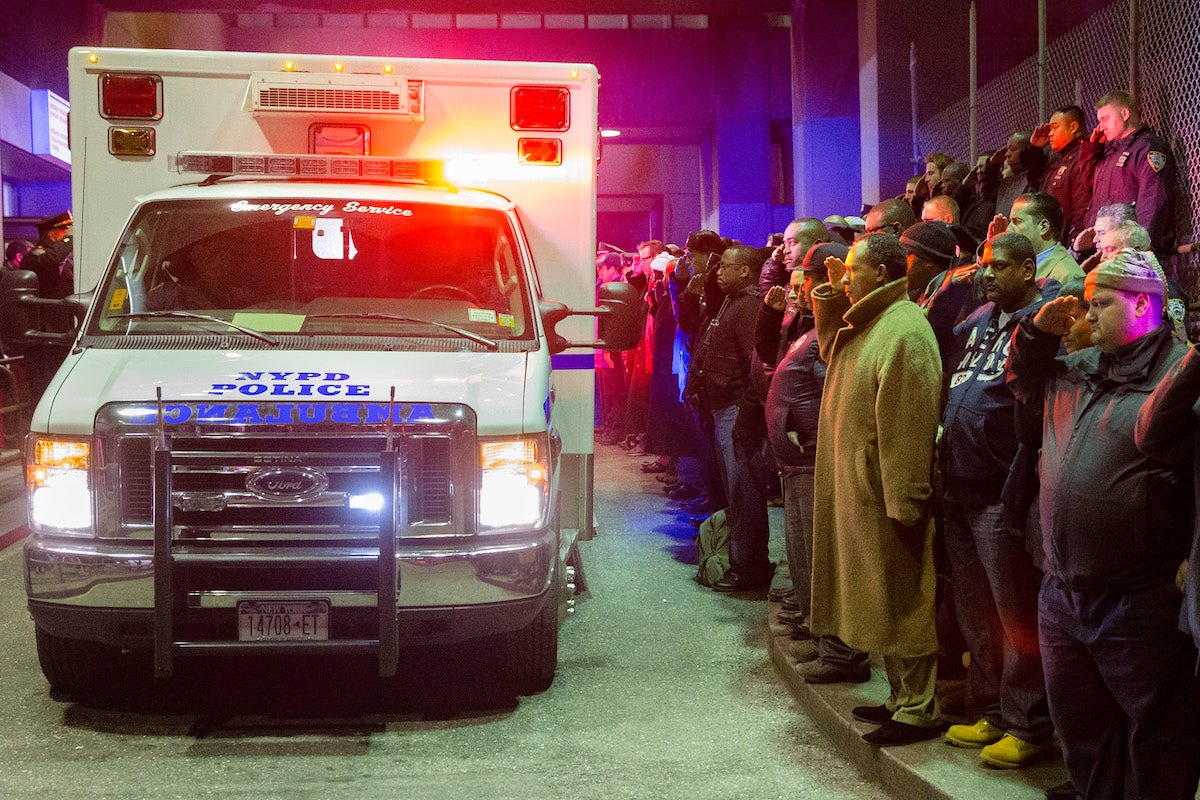NYPD cop killer does not represent us
Listen
Mourners stand at attention as the bodies of two fallen NYPD police officers are transported from Woodhull Medical Center in New York. / AP Photo
My prayers go out to the families of the two New York police officers who were shot to death while sitting in a patrol car in Brooklyn on Saturday.
Police identified the shooter as 28-year-old Ismaaiyl Brinsley, of Georgia, who allegedly shot and seriously wounded a woman in Baltimore before driving to New York. That’s when police say he approached the patrol car and opened fire, fatally wounding officers Wenjian Liu and Rafael Ramos.
Brinsley then fled to the subway, where he shot and killed himself, according to police.
Social media postings purportedly made by Brinsley are being investigated. Several published reports said the postings—allegedly made on Instagram—contained threats against police that alluded to Eric Garner and Michael Brown, two black men killed by police in separate incidents. Those two cases, and the decisions of grand juries not to indict the officers involved, have sparked national outrage, but protests have largely been peaceful.
The Garner and Brown families have denounced the actions of Brinsley or anyone else who would turn to violence in the wake of their loved ones’ deaths.
I join the families in that sentiment, but in reality, it’s not about Brinsley at this point. It’s about us. Whether Brinsley’s actions were driven by a desire for retribution, a thirst for recognition, or just plain madness, our motives in the wake of his actions must be driven by a desire for peace.
We must work toward helping the families of these fallen police officers—men who at the time of their deaths were working overtime, just like so many of us do—in an effort to provide for their families.
Because as much as we’d like to believe otherwise, underneath their uniforms, these men were much like the rest of us, and in order for us to heal as a nation, we must begin to understand that simple fact. On either side of the thin blue line that separates police from civilian, we all have the same aspirations. Chief among those aspirations is justice.
If we truly want justice for all the victims of senseless violence, and not just the ones who look like us, we must do more than stand up for the rights of civilians shot by police. We must also stand up for the rights of police shot by civilians.
Just as it was wrong for Eric Frein to allegedly ambush two state troopers in upstate Pennsylvania due to his long-running grudge against police, it was wrong for Ismaaiyl Brinsley to shoot two New York police officers due to his own apparent grudge against police.
But we must be careful to view Brinsley in the same way that Frein was viewed—as an outlier whose actions reflected on no one other than himself.
Brinsley doesn’t represent those who are calling for justice in the deaths of unarmed men and women killed by police. He represents himself, and he alone is responsible for his actions.
Just as I have repeatedly said that the policemen who killed unarmed men don’t represent the majority of officers, Brinsley is not a metaphor for the protesters seeking justice. He is an individual. In fact, we’re all individuals, no matter how we look, or where we come from, or where we work.
If only we could remember that more consistently. Perhaps then we would choose to see beyond stereotypes; to listen instead of shouting; to come together before coming apart.
Perhaps, in this moment when grief has once again settled upon us, each side will stop to pray for the other. Or even more miraculously, we will abandon sides altogether, and work to find solutions.
The families of Wenjian Liu and Rafael Ramos deserve at least that much, just like the families of Michael Brown and Eric Garner.
WHYY is your source for fact-based, in-depth journalism and information. As a nonprofit organization, we rely on financial support from readers like you. Please give today.


